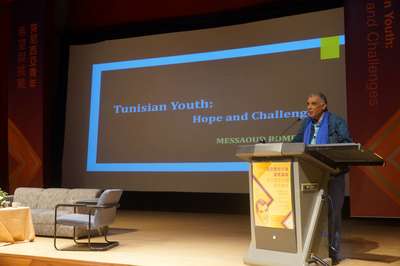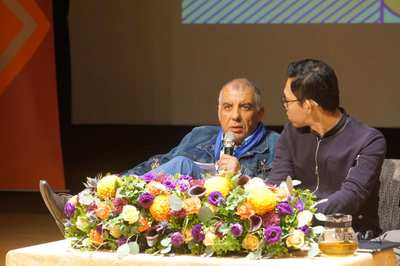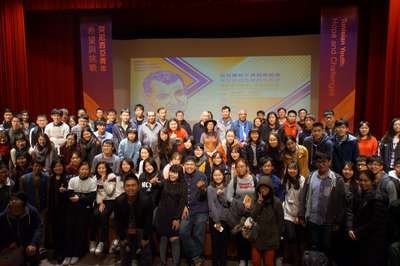Nobel Peace Prize International Forum Held in NCKU



Messaoud Romdhani, one of the members of the Nobel-winning Tunisian National Dialogue Quartet, came to NCKU to give a speech about the hope and challenge which are faced by Tunisian Youth and share the experience of the democratization of Tunisia.
The Tunisian National Dialogue Quartet is a group of four organizations, including the Tunisian General Labour Union (UGTT), The Tunisian Confederation of Industry, the Trade and Handicrafts (UTICA), the Tunisian Human Rights League (LTDH), and the Tunisian Order of Lawyers (TOL). After the 2011 Jasmine Revolution, the country was in turmoil. The Quartet was thus established to bridge the gap between governments and citizens and build a pluralistic democracy, facilitating the conversations among different parties.
In the speech, he emphasized the importance of democracy and social justice. He said that, even though we have different skin colors or religions, we share the same aspiration for freedom and deserve respect from others. Democracy and social justice are indispensable.
He stated that the Jasmine Revolution was not an event of a time but an accumulation of discontent throughout those years. What people were against was not just the president but the entire system. At that time, the educated youth with the school certificates had no future; therefore, they stood up calling for freedom, dignity, social justice, and were against corruption.
Never had he seen such resilience in the youth. He said that we should not underestimate the youth power. During the revolution, they helped spread the information via social media such as Facebook and Twitter. This is one of the keys to the success of the revolution.
Romdhanim was glad to see that most of the audience today werethe youth who are about the same age as those engaged in the Jasmine Revolution 7 years ago. He encouraged students to not only pay attention to their studies but also the future of both their country and all human beings. He pointed out that the forum today was a good example to familiarize students with any current global issues.
The Tunisian National Dialogue Quartet has established an alternative peaceful political process during the Tunisia’s transition to democracy. It helped avoid the rise of populism and the explosion of civil war. In 2015, the Quartet was awarded the 2015 Nobel Peace Prize for its contribution to the building of a pluralistic democracy in Tunisia.
Apart from the forum, NCKU displayed relevant books at the first floor of the main library by December 22nd, including A Rage for Order:The Middle East in Turmoil, from Tahrir Square to ISIS, The Dictator's Learning Curve: Inside the Global Battle for Democracy, and Tunisia: economic, political and social issues, and many E-books.
The Tunisian National Dialogue Quartet is a group of four organizations, including the Tunisian General Labour Union (UGTT), The Tunisian Confederation of Industry, the Trade and Handicrafts (UTICA), the Tunisian Human Rights League (LTDH), and the Tunisian Order of Lawyers (TOL). After the 2011 Jasmine Revolution, the country was in turmoil. The Quartet was thus established to bridge the gap between governments and citizens and build a pluralistic democracy, facilitating the conversations among different parties.
In the speech, he emphasized the importance of democracy and social justice. He said that, even though we have different skin colors or religions, we share the same aspiration for freedom and deserve respect from others. Democracy and social justice are indispensable.
He stated that the Jasmine Revolution was not an event of a time but an accumulation of discontent throughout those years. What people were against was not just the president but the entire system. At that time, the educated youth with the school certificates had no future; therefore, they stood up calling for freedom, dignity, social justice, and were against corruption.
Never had he seen such resilience in the youth. He said that we should not underestimate the youth power. During the revolution, they helped spread the information via social media such as Facebook and Twitter. This is one of the keys to the success of the revolution.
Romdhanim was glad to see that most of the audience today werethe youth who are about the same age as those engaged in the Jasmine Revolution 7 years ago. He encouraged students to not only pay attention to their studies but also the future of both their country and all human beings. He pointed out that the forum today was a good example to familiarize students with any current global issues.
The Tunisian National Dialogue Quartet has established an alternative peaceful political process during the Tunisia’s transition to democracy. It helped avoid the rise of populism and the explosion of civil war. In 2015, the Quartet was awarded the 2015 Nobel Peace Prize for its contribution to the building of a pluralistic democracy in Tunisia.
Apart from the forum, NCKU displayed relevant books at the first floor of the main library by December 22nd, including A Rage for Order:The Middle East in Turmoil, from Tahrir Square to ISIS, The Dictator's Learning Curve: Inside the Global Battle for Democracy, and Tunisia: economic, political and social issues, and many E-books.



